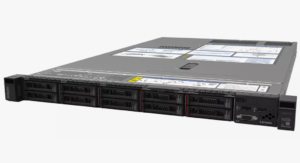
Servers are undergoing a dramatic transformation fueled by the rise of cloud computing. As more businesses and individuals embrace cloud-based solutions, the pressure on servers to adapt and evolve has never been greater.
The importance of servers can be well determined by these numbers as one of the reports states:
The global server market is projected to grow at a CAGR of 11.71% from 2025 to 2029, reaching a market value of $207.6 billion by 2029.
So, how are servers meeting the challenge of an increasingly cloud-driven world?
This article delves into seven key ways servers are evolving to keep up with the demands of modern computing.
From advanced cloud solutions to the integration of artificial intelligence, these advancements are revolutionizing how servers operate, delivering faster, more secure, and more efficient services for businesses and consumers alike.
Let’s explore how these changes are reshaping the future of servers and why they matter to you.
1. Shift Towards Virtualization
Virtualization is revolutionizing how servers operate. Instead of relying on physical machines, virtual servers allow one physical server to host multiple virtual ones. By implementing cloud solutions businesses can scale their operations without the need for additional hardware. This makes servers more efficient and cost-effective, enabling organizations to manage workloads seamlessly while reducing overhead costs.
With virtualization, businesses can reduce hardware costs and energy consumption. It also allows for better server utilization, as virtual servers can be adjusted based on workload demands. This shift enables companies to scale their operations faster and more effectively.
2. Adoption of Edge Computing
Edge computing is becoming a game-changer in the server world. Instead of sending data to centralized servers, edge computing processes data closer to the user. This minimizes delays and improves performance.
Do you know?
The global edge computing market, valued at $16.45 billion in 2023, is projected to grow at a 36.9% CAGR from 2024 to 2030.
Benefits of Edge Computing
- Reduced Latency: By processing data in users, edge computing ensures faster response times.
- Cost Efficiency: It reduces bandwidth usage by processing only necessary data in the cloud.
- Improved Security: With localized processing, sensitive data stays closer to its source.
Where Edge Computing is Used
- IoT Devices: Sensors and smart gadgets rely heavily on edge computing.
- Streaming Services: Real-time processing helps deliver smoother video and music streaming.
Why This Matters for You
If you use cloud-based apps or smart devices, edge computing ensures faster, more reliable services.
3. Energy-Efficient Server Designs
As sustainability becomes a priority, servers are being designed to use less energy. Companies are adopting greener practices to reduce their environmental impact.
Key Features of Energy-Efficient Servers:
- Use of renewable energy sources for powering data centers.
- Advanced cooling technologies to lower electricity use.
- Low-power processors designed specifically for energy savings.
- Modular designs that allow easier upgrades without full replacements.
- Automated systems to optimize server performance and power use.
These advancements help businesses cut costs while being eco-friendly. It’s a win-win for companies and the planet.
4. Improved Scalability with Hybrid Clouds
Hybrid cloud solutions combine public and private clouds for better flexibility. They allow businesses to store sensitive data privately while still taking advantage of public cloud services.
Benefits of Hybrid Clouds
- Increased Flexibility: You can move workloads between private and public clouds based on your needs.
- Enhanced Security: Critical data stays within private servers, reducing risks.
Why Hybrid Clouds are Gaining Popularity
- They bridge the gap between security and scalability.
- Businesses can save costs while keeping sensitive data safe.
How Hybrid Clouds Impact You
Hybrid clouds make online services like banking and e-commerce faster, more secure, and reliable.
5. Automation and AI Integration in Servers
Automation and AI are playing a significant role in server evolution. These technologies, combined with advanced cloud solutions, help servers manage workloads, predict issues, and optimize resources. By leveraging cloud solutions, businesses can scale their operations effortlessly while AI and automation ensure that server performance remains optimal and issues are addressed before they impact users.
How AI and Automation Are Changing Servers:
- Automated systems handle routine server maintenance, reducing manual errors.
- AI-powered analytics monitor server performance in real time.
- Predictive algorithms identify potential failures before they happen.
- Workload distribution is optimized to improve speed and efficiency.
- Resource allocation is automated, saving time and money.
With AI and automation, servers are smarter and more reliable than ever, ensuring a smoother experience for users.
6. Focus on Data Security and Privacy
In a cloud-driven world, data security is a top priority. Servers are now equipped with advanced encryption and security protocols to protect sensitive information.
Server providers are also implementing zero-trust security models, where every access request is verified before granting permission. This approach minimizes risks and ensures user data is always secure.
For individuals and businesses, these advancements mean more confidence in storing and sharing data online without worrying about breaches.
7. The Rise of Serverless Computing
Serverless computing is another major innovation in the server industry. It allows developers to run applications without managing the underlying server infrastructure.
With serverless computing, users only pay for the exact resources they use, making it a cost-effective solution. This approach also enables faster application deployment and eliminates the need for complex server management.
For businesses and developers, serverless computing reduces overhead and increases focus on delivering better user experiences.
Conclusion
Servers are evolving rapidly to keep up with the demands of a cloud-driven world. From virtualization and edge computing to AI-powered automation and serverless solutions, these changes are making servers faster, smarter, and more efficient. Cloud solutions are also playing a key role in enabling businesses to scale quickly and securely, offering flexible and cost-effective options for data storage and processing.
These advancements not only benefit businesses but also ensure better performance, security, and reliability for everyday users like you. As technology continues to advance, the role of servers will remain crucial in shaping a more connected and efficient future.
Read More: How Hybrid AI Is Shaping The Future Of Customer Support






